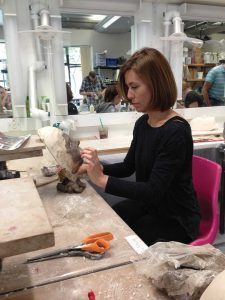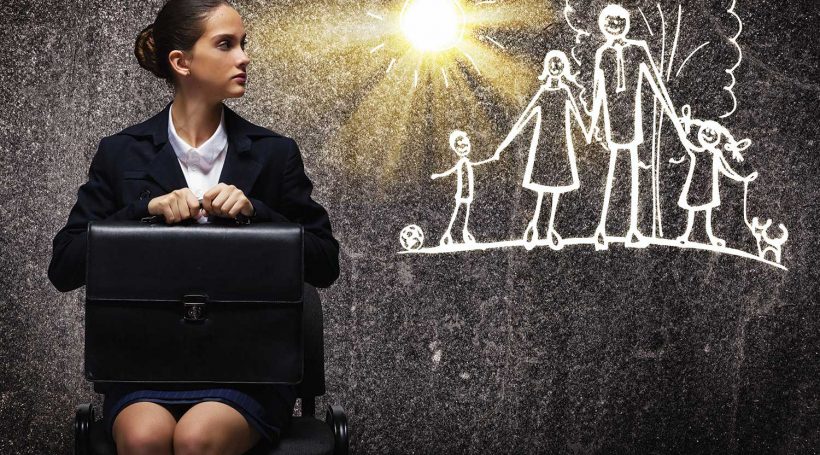Erin Bitman eyed the young woman before her. She studied the woman’s pale, pimply face, the burst capillaries of her sallow skin and oozing wounds. A smile crept over Bitman’s face as she thought of the beautiful 23-year-old model who had walked in the door just a few hours ago – before Bitman worked her magic.
Bitman, 37, recently traveled to London to study to be a makeup artist at Delamar Academy. Attending the school had been a lifelong dream, but her decision to leave husband Michael, and sons Sam, 11, Jack, 8, and Luke, 4, behind in Cherry Hill was heart-wrenching. Internal doubts and disapproval from friends and family almost prevented her from going.

Bitman spent three months in London studying to be a makeup artist
“So many people kept saying, ‘Why are you doing this?’ ‘I think you’re wrong,’ ‘I think you’re going to hurt the children,’” she recalls. “Sometimes it could be sincere, but sometimes not. I got so much negativity.”
That reaction continued even after Bitman returned home. “I had to literally shut them out and say, ‘That’s your opinion,’” she says. “It’s my life. Was I older doing this? Absolutely. Is it not the norm? Absolutely. But who’s to say I couldn’t do it? That’s just people’s fears and insecurities speaking. I’ve had to block it out of my head.”
It’s the mommy-wars, says Rutgers professor Terry Boyer. That’s a term that describes the “us versus them” attitude between working moms and stay-at-home moms.
“There’s been artificial tension that’s been created from stay-at-home moms who are doing the definite, needed and important work of caregiving at home, and then there are mothers who choose to work who are blamed for not giving the support at home that has traditionally been the role of the woman,” says Boyer, assistant professor and executive director of the Center for Women and Work at Rutgers.
Boyer discounts those who believe working mothers are being selfish and that their choice hurts families.
“Research shows their children are as healthy as children in families with stay-at-home mothers,” she says. “The most important part to having children who are raised well and are secure and confident is to have a parent who’s happy in whatever they choose. If you have a parent who’s not happy, it’s going to have a negative impact on the child.” Even, adds Boyer, if finding that happiness means taking three months away from your children to fulfill your life’s dream, as Bitman did.
“I talked to pediatricians and counselors to be sure my kids would really be OK. I had to get myself mentally ready for it,” Bitman says. “The kids wrote me letters saying how proud they were of me and put them in my suitcase. They said they understood why I was leaving them, that it was to fulfill a dream.”

Erin Bitman’s husband and sons visited her while she studied in London
Bitman’s husband, Michael, adjusted his work hours to be able to have breakfast with the kids every morning until the babysitter arrived, and family members pitched in to help. “And technology today can’t be dismissed,” says Michael. “We texted all the time. It didn’t seem like we were so far apart.”
Seventy percent of mothers with children under 18 have jobs in addition to motherhood, according to the U.S. Department of Labor. Many of those working moms find they have to make trade-offs of some kind.
“We play out in our workplaces that women have to give up something in order to have a successful career as well as be a mother,” says Boyer. “It doesn’t necessarily have to be that way, because certainly men have been doing fatherhood and careers for a long time. If you’re going to have two people in a family working full-time, you need to find support from someplace else but not blame yourself for that change. This is something that is right and good, and you should be looking for fulfillment in both your career and your role as a parent.”
Assemblywoman Pamela Lampitt, 54, juggled two careers while her children, Ilene, 28, and Andrew, 26, were young. Having worked as an administrator for the University of Pennsylvania for 33 years and holding political office for more than 10 years, Lampitt learned long ago to balance home and work.
“I love working at the University of Penn, but when I felt I wanted to expand myself and do more, I needed to balance that with the fact that my children had busy, busy lifestyles, with school, sports and friends,” she says. She started slowly, first volunteering for the cancer research and treatment center City of Hope. She found that was a manageable addition to her schedule, but Lampitt’s natural curiosity about her hometown of Cherry Hill led her to another path.
“I’d wonder: Why does that sign look like that? How come they built this in this way?” she remarks on why she took a seat on the town’s zoning board. “That didn’t take away too much from my family, because it was only two nights during the month plus the preparation you had to do. It all fit into my lifestyle. I was being involved, helping raise money for City of Hope, participating in my town, all the while balancing Penn and my children and their lifestyles.”
Lampitt relied heavily on support from after-school care, her husband, her staffs and friends. “You can’t do any of this alone,” she says. “We all need friends to help us bring up our children. It takes a village to make a man or a woman.”
“Support is absolutely critical,” agrees Boyer. “A lot of time that’s other moms who can talk about what’s challenging – it’s reassurance that you’re not the only one.”
Even with the support, Lampitt still had to make sacrifices. “There’d be a challenge where your child needed you and you were at a council meeting, or they had a soccer game and you couldn’t get to it,” she recalls. “What am I going to do? What’s important? What I learned was to strike that right balance. I had to be careful saying yes to things that weren’t family-related.
“When you have to choose, you choose family first. When I recently had to attend a funeral in Boston for a woman who was like a mother to me after my mother’s passing, I chose that even though I had to miss a committee hearing. Family values are so important – you do have to make a decision. It’s how you make those decisions that shows the integrity of who you are.”
But choosing family isn’t always possible when you are an ocean away. “I know that Luke had a hard time toward the end,” says Bitman. “He’s only 4. He said something like, ‘I don’t have a mommy.’ That broke my heart. When I came home he said, ‘I have a mommy again.’”
But Bitman’s absence may have been toughest on Sam. “I graduated fifth grade, and my mom wasn’t there,” he says. “It was a big thing for me at the time and to not have her there was hard.”
Boyer urges working moms to set realistic goals about the level of engagement they can have in their child’s life. “We’ve created a lot of guilt as a society, and it’s artificial,” she says. “Set a goal for yourself at the beginning of the school year that you’re going to make two or three events in the month, and your partner is going to make the other two. This is what you know your life and your job can accommodate.”
In hindsight, Bitman is sure she made the right decision. She now travels regularly to New York City to work.
When Lampitt ran for town council, serving from 2004 to 2006, and then Assembly, where she’s served since 2006, she also had to consider the emotional challenges her children would face.
“I had to think about whether my children – 14 and 16 at the time – could convey why their mother would make a decision that somebody else would question. I thought my kids could defend themselves if somebody said, ‘Why would your mother make that bad decision or vote that way?’”
As the time commitment and responsibilities of her careers increased, her kids were getting older and more self-sufficient. Even so, she admits she has had to make personal sacrifices.
“I have absolutely no free time, because I choose not to,” Lampitt says. “I’m not movie current. I have very limited time to get things done, though I’ve become much more efficient. The only thing I still do for myself, which is for my family too, is that I cook. I’m a trained chef [She earned a culinary arts degree from Johnson and Wales University in 1981], and cooking is my therapy.”
As women continue to perform the juggling act, guilt is the first thing that must go, says Boyer. She predicts these decisions will become easier for women over time.
“Women have to stop blaming themselves,” she says. “Once workplaces start acknowledging, understanding and adapting to the fact that most families have two parents who work and that a happy worker is also a happy parent, then we’re going to be a lot better off. People are going to be more understanding. Don’t give in to the guilt.”











